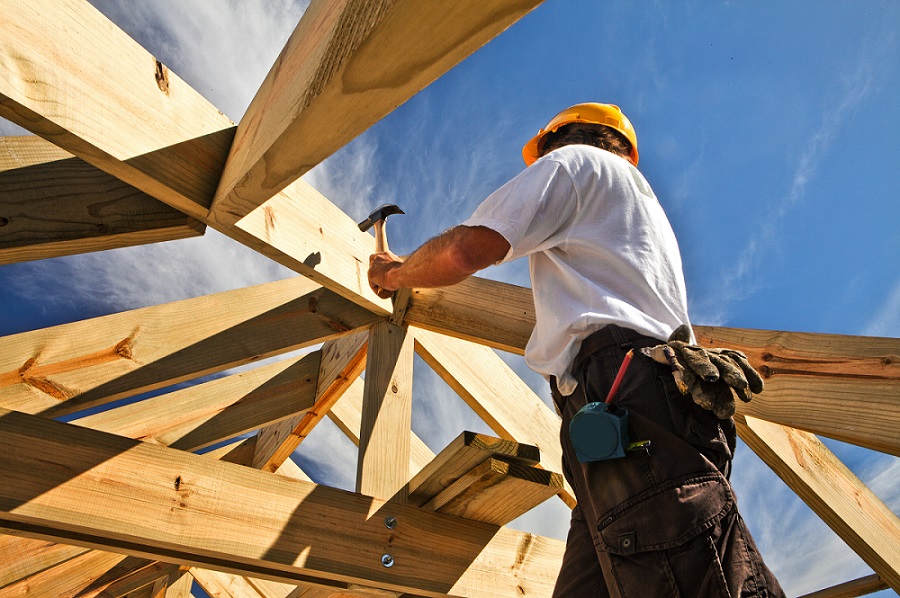In retrospect, the 2023 construction downturn was not too bad. The downturn we expected earlier has been brought forward. 2024 will show markedly weaker results. Companies will receive fewer orders and ongoing jobs will be increasingly postponed. It is possible that the second half of the year will show something of a recovery. Interest rates stabilising at higher levels are not helping. So is the 2023 wage indexation. Furthermore, government legal measures (such as partial abolition of lower VAT rate) are having a negative impact. And also, prices of building materials are stabilising at a relatively high level.
Construction companies are struggling the most to operate profitably. Almost half have to settle for a break-even result. Order books are also moderately filled. 4 out of 10 construction companies predict that 2024 will be worse than 2023. 2 out of 3 construction companies foresee a drop in work volume, especially for new house construction. Among house builders and structural contractors, this even rises to 9 out of 10. According to figures from Bouwunie. New construction in particular is in the corner where the blows are falling.
Key concerns construction sector
1. Number of building permits
The number of building permits granted in the first 10 months of 2023 fell by 13%. This trend is continuing. Manufacturers of building materials therefore scaled back their production. Production of building materials such as concrete, cement and bricks was almost a quarter lower at the end of 2023 than at the beginning of 2022.
2. Bankruptcies
Bankruptcy figures are rising sharply across the board, but construction is the hardest hit sector. Last year, more than 10,000 companies went bankrupt in Belgium, of which more than 2,000 were in construction. In the first two months of 2024, nearly 500 construction companies went bankrupt. With the bankruptcies, we also loose qualified employees.
3. Abolition of preferential VAT rate
The Belgian government's move to remove the favourable 6 per cent VAT rate for demolition and reconstruction for non-private builders is causing a lot of anger. Major projects to expand and renew the severely outdated housing stock are being postponed as a result. The implementation of necessary sustainability measures is being delayed as a result.
4. Renovation duty
The statutory renovation obligation also has a negative effect. Anyone buying a single-family house or flat with EPC label E or F must upgrade their property to label D within five years of purchase. That time limit deters buyers. People who have just enough money to buy an affordable property come under pressure because they are not allowed to renovate the property incrementally (over a longer period of time). Short-term renovation costs are too high so people refrain from buying.
5. Lower energy prices inhibit renovation market
Lower energy prices mean good news for many people, but for the installation industry and the renovation market it is having a negative impact. As energy prices fall, the need to improve the energy efficiency of buildings is reduced.
6. Cost of building materials remains relatively high
Lower energy prices could have a beneficial effect on the price of energy-intensive building materials (especially concrete and cement). But this hardly appears to be the case. The high cost of the necessary basic materials for these and also for transport is holding back a significant drop in prices. A number of other building materials, such as wood and plastics, did fall in recent months but are still substantially higher than before 2022.
7. Positive factors
- 85% of homes do not currently meet 2050 energy standards. The number of renovations needs to be quadrupled to meet climate targets by 2050.
- Aging public infrastructure (such as highways, railways, etc.) will need major renovation in the next decade.
- 2024 is an election year (federal and regional elections, municipal and district council elections). Traditionally, these are years with an increase in the number of public infrastructure projects.
The future & Key trends in the construction industry
A deep downturn in construction is not on the cards. For that, the sector is sufficiently supported by trends such as persistent housing shortage, the major renovation task and energy transition. Although, of course, there are always external circumstances that can throw a spanner in the works. Think of Ukraine and related international tensions, rising inflation and higher interest rates.
Moderate broad-based output growth is expected in the medium term. Thus, sustainability continues to provide additional growth in all sectors. Employment will also pick up.
Key trends:
- Sustainable building
In the coming years, there will be a growing demand for energy-efficient and environmentally friendly buildings.
- Digitisation and building information modelling (BIM)
Digitally modelling the entire construction process improves cooperation, efficiency and communication between construction partners.
- Prefabrication and modular construction
Pre-fabricating construction components in the factory offers benefits such as faster construction time, reduced failure costs, less waste and improved quality control.
- Renovation and repurposing
Partly because of sustainability, there is a growing focus on renovation and repurposing of existing buildings instead of new construction in the coming years.
- Circularity
Minimising waste and maximising the reuse of materials.
- Innovative technologies
Technological developments such as 3D printing, robotics, drones and smart building techniques are increasing efficiency, safety and productivity in the construction sector.
Payment behaviour worsens
Our research department's own research shows that companies worldwide are paying their invoices increasingly late. This also plays out in Europe and Belgium. This has everything to do with the general economic downturn as seen in the construction industry. Higher operating and financing costs are also a factor. That later payment is extremely difficult for many companies. This puts pressure on working capital. Construction companies thus put each other in trouble. As a logical consequence, the risk of payment default and bankruptcy increases. This can also affect healthy companies. A grot e unpaid invoice is a nightmare for many entrepreneurs. Our researchers explicitly warn about the increase in bankruptcies in the construction sector.
How can construction companies protect themselves?
The sharp increase in bankruptcies in the Belgian construction sector is a major alarm signal for construction entrepreneurs. They are increasingly likely to be left with unpaid invoices. That blow can hit hard. The consequences can be cushioned with a trade credit insurance. We have a solution for every type of business. Whether an invoice is paid or not is no longer a worry, companies are sure of their money with our trade credit insurance. This provides security and removes anxiety. We take over the debtor risk from the company. Don't customers pay? Then we compensate the affected company. In addition, we provide companies that take out a trade credit insurance with us with information on the creditworthiness of their (potential) customers. On a daily basis, we analyse the financial situation of customers and prospects.




